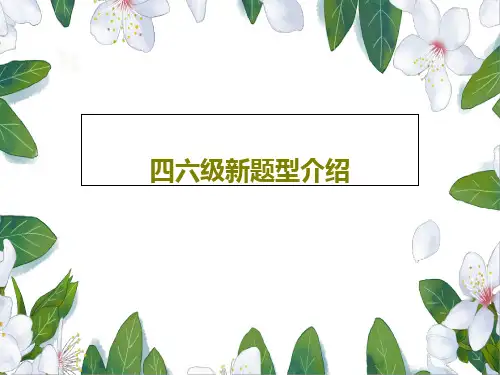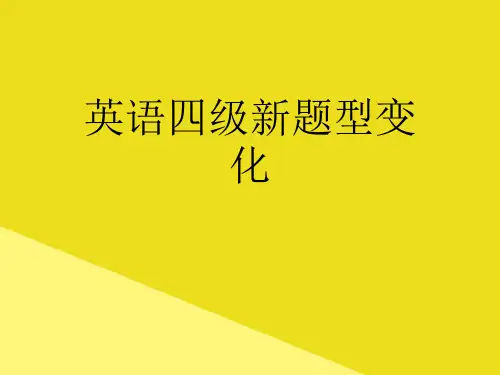大学英语四六级新题型简介共30页
- 格式:ppt
- 大小:3.42 MB
- 文档页数:30
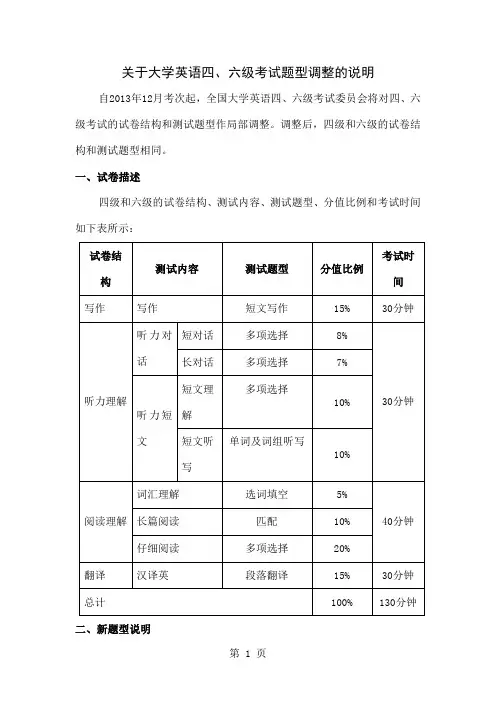
关于大学英语四、六级考试题型调整的说明自2013年12月考次起,全国大学英语四、六级考试委员会将对四、六级考试的试卷结构和测试题型作局部调整。
调整后,四级和六级的试卷结构和测试题型相同。
一、试卷描述四级和六级的试卷结构、测试内容、测试题型、分值比例和考试时间如下表所示:二、新题型说明1. 单词及词组听写原复合式听写调整为单词及词组听写,短文长度及难度不变。
要求考生在听懂短文的基础上,用所听到的原文填写空缺的单词或词组,共10题。
短文播放三遍。
2. 长篇阅读原快速阅读理解调整为长篇阅读理解,篇章长度和难度不变。
篇章后附有10个句子,每句一题。
每句所含的信息出自篇章的某一段落,要求考生找出与每句所含信息相匹配的段落。
有的段落可能对应两题,有的段落可能不对应任何一题。
3. 翻译原单句汉译英调整为段落汉译英。
翻译内容涉及中国的历史、文化、经济、社会发展等。
四级长度为140-160个汉字;六级长度为180-200个汉字。
三、成绩报道成绩报道分为总分和单项分。
单项分包括:1)听力,2)阅读,3)翻译和写作。
四、样题大学英语四级考试样题见附件1。
(附件为PDF格式文件)大学英语六级考试样题见附件2。
全国大学英语四、六级考试委员会 2013年8月14日附件1。
Part I Writing (30 minutes) Directions: For this part, you are allowed 30 minutes to write an essay. You shouldstart your essay with a brief description of the picture and then expressyour views on the importance of learning basic skills. You should write atleast 120 words but no more than 180 words. Write your essay on Answer Sheet 1.注意:此部分试题请在答题卡 1 上作答。
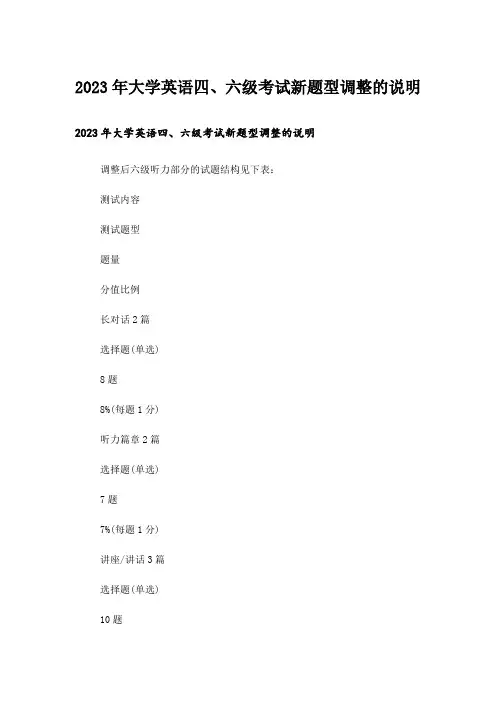
2023年大学英语四、六级考试新题型调整的说明2023年大学英语四、六级考试新题型调整的说明调整后六级听力部分的试题结构见下表:测试内容测试题型题量分值比例长对话2篇选择题(单选)8题8%(每题1分)听力篇章2篇选择题(单选)7题7%(每题1分)讲座/讲话3篇选择题(单选)10题20%(每题2分)1、六级听力之不变原来的长对话题型不变,依然是2篇。
但题目数量由7道题增至8题,依然每题1分;篇章听力题型不变,但题目数量由原来的3篇共10道题减少至2篇共7题,每题1分。
题型及难度没有变化,考生可参考旧题。
2、六级听力之变化短对话取消,听写取消。
增加讲座/讲话题型3篇共10道题,每题2分,是六级听力考试乃至全卷的关键。
下面我们就来详细解析一下新题型:Now listen to the following recording and answer questions 16 to 19.16. A) They investigate the retirement homes in America.B) They are on issues facing senior citizens in America.C) They describe the great pleasures of the golden years.D) They are filled with fond memories of his grandparents.17. A) The loss of the ability to take care of himself.B) The feeling of not being important any more.C) Being unable to find a good retirement home.D) Leaving the home he had lived in for 60 years.18. A) The loss of identity and self-worth.B) Fear of being replaced or discarded.C) Freedom from pressure and worldly cares.D) The possession of wealth and high respect.19. A) The urgency of pension reform.B) Medical care for senior citizens.C) Finding meaningful roles for the elderly in society.D) The development of public facilities for senior citizens.原文:Moderator:Hello Ladies and Gentleman, it gives me great pleasure to introduce our keynote speaker for todays session, Dr. Howard Miller. Dr. Miller, Professor of Sociology at Washington University, has written numerous articles and books on the issues facing older Americans in our graying society for the past 15 years. Dr. Miller:Dr. Miller: Thank you for that introduction. Today, Id like to preface my remarks with a story from my own life which I feel highlights the common concerns that bring us here together. Several years ago when my grandparents were well into their eighties, they were faced with the reality of no longer being able to adequately care for themselves. My grandfather spoke of his greatest fear, that of leaving the only home they had known for the past 60 years. Fighting back the tears, he spoke proudly of the fact that he had built their home from the ground up, and that he had pounded every nail and laid every brick in the process. The prospect of having to sell their home and give up their independence, and move into a retirement home was an extremely painful experience for them. It was,in my grandfathers own words, like having a limb cut off. He exclaimed in a forceful manner that he felt he wasnt important anymore.For them and some older Americans, their so-called “golden years”are at times not so pleasant, for this period can mean the decline of not only ones health but the loss of identity and self-worth. In many societies, this self-identity is closely related with our social status, occupation, material possessions, or independence. Furthermore, we often live in societies that value what is “new” or in fashion, and our own usage of words in the English language is often a sign of bad news for older Americans. I mean how would your family react if you came home tonight exclaiming, “Hey, come to the living room and see the OLD black and white TV I brought!” Unfortunately, the word “old” calls to mind images of the need to replace or discard.Now, many of the lectures given at this conference have focused on the issues of pension reform, medical care, and the development of public facilities for senior citizens. And while these are vital issues that must be addressed, Id like to focus my comments on an important issue that will affect the overall success of the other programs mentioned. This has to do with changing our perspectives on what it means to be a part of this group, and finding meaningful roles the elderly can play and should play in our societies.First of all, Id like to talk about . . .16. What does the introduction say about Dr. Howard Millers articles and books?17. What is the greatest fear of Dr. Millers grandfather?18. What does Dr. Miller say the “golden years” can often mean?19. What is the focus of Dr. Millers speech?解:这是一篇关于老龄化社会,老年人的晚年生活等问题的演讲。
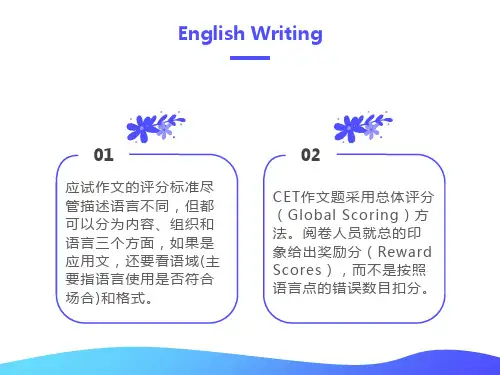

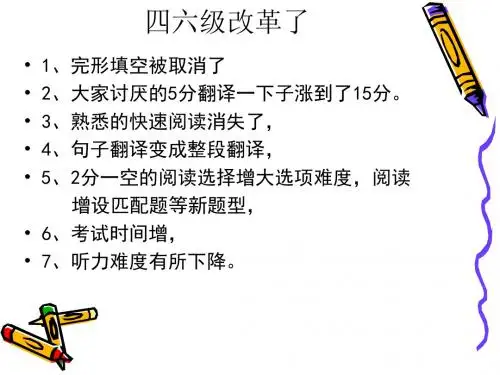
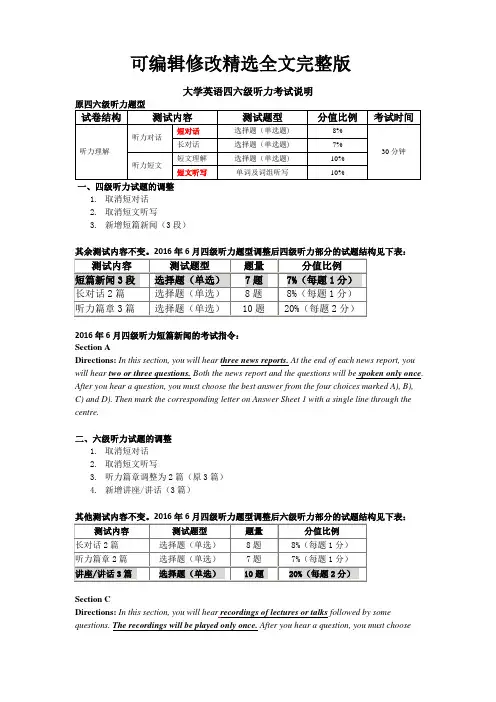
可编辑修改精选全文完整版大学英语四六级听力考试说明一、四级听力试题的调整1.取消短对话2.取消短文听写3.新增短篇新闻(3段)其余测试内容不变。
2016年6月四级听力题型调整后四级听力部分的试题结构见下表:2016年6月四级听力短篇新闻的考试指令:Section ADirections: In this section, you will hear three news reports. At the end of each news report, you will hear two or three questions. Both the news report and the questions will be spoken only once. After you hear a question, you must choose the best answer from the four choices marked A), B), C) and D). Then mark the corresponding letter on Answer Sheet 1 with a single line through the centre.二、六级听力试题的调整1.取消短对话2.取消短文听写3.听力篇章调整为2篇(原3篇)4.新增讲座/讲话(3篇)Section CDirections: In this section, you will hear recordings of lectures or talks followed by some questions. The recordings will be played only once. After you hear a question, you must choosethe best answer from the four choices marked A), B), C) and D). Then mark the corresponding letter on Answer Sheet 1 with a single line through the centre.四级听力样题Questions 1 and 2 will be based on the following news item.Kenyan police say one person was killed and 26 injured in an explosion at a bus station in central Nairobi. The blast hit a bus about to set off for the Ugandan capital Kampala. Last July, the Somali group al-Shabab said it was behind the blasts in the Ugandan capital which killed more than 70 people. Will Ross reports from the Kenyan capital.The explosion happened beside a bus which was about to set off for an overnight journey from Nairobi to the Ugandan capital Kampala. Some eyewitnesses report that a bag was about to be loaded on board, but it exploded during a security check. Windows of the red bus were left smashed, and blood could be seen on the ground beside the vehicle. Just hours earlier, Uganda’s police chief had warned of possible Christmas-time attacks by Somali rebels.1. What is the news report mainly about?2. When did the incident occur?Questions 1 and 2 will be based on the following news item.1.A) Christmas-time attacks made by Somali rebels.B) An explosion at a bus station in central Nairobi.C) The killing of more than 70 Ugandans in Kampala.D) Blasts set off by a Somali gr oup in Uganda’s capital.2.A) On Christmas Eve. C) During a security check.B) Just before midnight. D) In the small hours of the morning.Questions 3 and 4 will be based on the following news item.Woolworths is one of the best known names on the British High Street. It’s been in business nearly a century. Many of its 800 stores are likely to close following the company’s decision to call in administrators after an attempt to sell the business for a token £1 failed.The company has huge debts. The immediate cause for the collapse has been Britain’s slide toward recession, which has cut into consumer spending. However, the business had been in trouble for years.Known for low-priced general goods, Woolworths has struggled in the face of competition from supermarkets expanding beyond groceries and a new generation of internet retailers.Many of the store group’s 25,000 employees are likely to lose their jobs. Some profitable areas such as the DVD publishing business will survive.3. What do we learn about Woolworths from the news report?4. What did Woolworths attempt to do recently?Questions 3 and 4 will be based on the following news item.3. A) It is likely to close many of its stores.B) It is known for the quality of its goods.C) It remains competitive in the recession.D) It will expand its online retail business.4. A) Expand its business beyond groceries.B) Fire 25,000 of its current employees.C) Cut its DVD publishing business.D) Sell the business for one pound.Questions 5 to 7 will be based on the following news item.Cairo is known for its overcrowded roads, irregular driving practices and shaky old vehicles, but also for its air pollution. In recent months, though, environmental studies indicate there have been signs of improvement. That’s due in part to the removal of many of the capital’s old-fashioned black and white taxis. Most of these dated back to the 1960s and 70s and were in a poor state of repair.After new legislation demanded their removal from the roads, a low interest loan scheme was set up with three Egyptian banks so drivers could buy new cars. The government pays about $900 for old ones to be discarded and advertising on the new vehicles helps cover repayments.The idea has proved popular w ith customers ― they can now travel in air-conditioned comfort and because the new cabs are metered, they don’t have to argue over fares. Banks and car manufacturers are glad for the extra business in tough economic times. As for the taxi drivers, most are delighted to be behind the wheel of new cars, although there have been a few complaints about switching from black and white to a plain white colour.5. What change took place in Cairo recently?6. What helped bring about the change?7. Why do customers no longer argue with new cab drivers?Questions 5 to 7 will be based on the following news item.5. A) All taxis began to use meters.B) All taxis got air conditioning.C) Advertisements were allowed on taxis.D) Old taxis were replaced with new cabs.6. A) A low interest loan scheme. C) Taxi passengers’ complaints.B) Environmentalists’ protests. D) Permission for car advertising.7. A) There are no more irregular practices.B) All new cabs provide air-conditioning.C) New cabs are all equipped with meters.D) New legislation protects consumer rights.Section A1. B2. C3. A4. D5. D6. A7. C六级听力样题Now listen to the following recording and answer questions 16 to 19.Moderator (会议主持人):Hello Ladies and Gentleman, it gives me great pleasure to introduce our keynote speaker for today’s session, Dr. Howard Miller. Dr. Miller, Professor of Sociology at Washington Universit y, has written numerous articles and books on the issues facing older Americans in our graying society for the past 15 years. Dr. Miller:Dr. Miller:Thank you for that introduction. Today, I’d like to preface my remarks with a story from my ownlife which I feel highlights the common concerns that bring us here together. Several years ago when my grandparents were well into their eighties, they were faced with the reality of no longer being able to adequately care for themselves. My grandfather spoke of his greatest fear, that of leaving the only home they had known for the past 60 years. Fighting back the tears, he spoke proudly of the fact that he had built their home from the ground up, and that he had pounded every nail and laid every brick in the process. The prospect of having to sell their home and give up their independence, and move into a retirement home was an extremely painful experience for them. It was, in my grandfather’s own words, like having a limb cut off. He exclaimed in a forceful manner that he felt he wasn’t important anymore.For them and some older Americans, their so-called “golden years” are at times not so pleasant, for this period can mean the decline of not only one’s health but the loss of identity and self-worth. In many societies, this self-identity is closely related with our social status, occupation, material possessions, or independence. Furthermore, we often live in societies that value what is “new” or in fashion, and our own usage of words in the English language is often a sign of bad news for older Americans. I mean how would your family react if you came home tonight exclaiming, “Hey, come to the living room and see the OLD black and white TV I brought!” Unfortunately, the word “old” calls to mind i mages of the need to replace or discard.Now, many of the lectures given at this conference have focused on the issues of pension reform, medical care, and the development of public facilities for senior citizens. And while these are vital issues that must be addressed, I’d like to focus my comments on an important issue that will affect the overall success of the other programs mentioned. This has to do with changing our perspectives on what it means to be a part of this group, and finding meaningful roles the elderly can play and should play in our societies.First of all, I’d like to talk about . . .16. What does the introduction say about Dr. Howard Miller’s articles and books?17. What is the greatest fear of Dr. Miller’s grandfather?18. What does Dr. Miller say the “golden years” can often mean?19. What is the focus of Dr. Miller’s speech?Now listen to the following recording and answer questions 16 to 19.16. A) They investigate the retirement homes in America.B) They are on issues facing senior citizens in America.C) They describe the great pleasures of the golden years.D) They are filled with fond memories of his grandparents.17. A) The loss of the ability to take care of himself.B) The feeling of not being important any more.C) Being unable to find a good retirement home.D) Leaving the home he had lived in for 60 years.18. A) The loss of identity and self-worth.B) Fear of being replaced or discarded.C) Freedom from pressure and worldly cares.D) The possession of wealth and high respect.19. A) The urgency of pension reform.B) Medical care for senior citizens.C) Finding meaningful roles for the elderly in society.D) The development of public facilities for senior citizens.Now listen to the following recording and answer questions 20 to 22.20. A) It seriously impacts their physical and mental development.B) It has become a problem affecting global economic growth.C) It is a common problem found in underdeveloped countries.D) It is an issue often overlooked by parents in many countries.21. A) They will live longer. C) They get along well with people.B) They get better pay. D) They develop much higher IQs.22. A) Appropriated funds to promote research of nutrient-rich foods.B) Encouraged breastfeeding for the first six months of a child’s life.C) Recruited volunteers to teach rural people about health and nutrition.D) Targeted hunger-relief programs at pregnant women and young children.Now listen to the following recording and answer questions 20 to 22.The 2010 Global Hunger Index report was released today by the International Food Policy Research Institute (IFPRI). It notes that, in recent years, experts have come to the conclusion that undernourishment between conception and a child’s second birthday can have serious andlong-lasting impacts.Undernourishment during this approximately 1,000-day window can seriously check the growth and development of children and render them more likely to get sick and die than well-fed children. Preventing hunger allows children to develop both physically and mentally.Says IFPRI’s Marie Ruel, “They will be more likely to perform well in school. They will stay in school longer. And then at adulthood, IFPRI has actually demonstrated that children who were better nourished have higher wages, by a pretty large margin, by 46 percent.”Ruel says that means the productivity of a nation’s future generations depends in a large part on the first 1,000 days of life.“This is why we’re all on board in focusing on those thousand days to improve nutrition. After that, the damage is done and is highly irreversible.”The data on nutrition and childhood development has been slowly coming together for decades. But Ruel says scientific consensus alone will not solve the problem.“It’s not enough that nutritionists know you have to intervene then, if we don’t have the politicians on board, and also the...people that implement [programs] in the field.”Ruel says there are encouraging signs that politicians and implementers are beginning to get on board. Many major donors and the United Nations are targeting hunger-relief programs at pregnant women and young children. They focus on improving diets or providing micro-food supplements. They improve access to pre-birth care and encourage exclusive breastfeeding for the first six months of a child’s life.Ruel says in the 1980s Thailand was able to reduce child undernourishment by recruiting a large number of volunteers to travel the countryside teaching about health and nutrition.“They really did very active promotion of diversity in the diet and good eating habits. So they were providing more food to people, but also educating people on how to use them, and also educating people on how to feed their young children.”Ruel says countries may take different approaches to reducing child undernutrition. But she saysnations will not make progress fighting hunger and poverty until they begin to focus on those critical first thousand days.20. What is the experts’ conclusion regarding children’s undernourishment in their earliest days of life?21. What does IFPRI’s Marie Ruel say about well-fed children in their adult life?22. What did Thailand do to reduce child undernourishment in the 1980s?Now listen to the following recording and answer questions 23 to 25.I’d like to look at a vital aspect of e-commerce, and that is the nature of the product or service. There are certain products and services that are very suitable for selling online, and others that simply don’t work.Suitable products generally have a high value-to-weight ratio. Items such as CDs and DVDs are obvious examples. Books, although heavier and so more expensive to post, still have a high enough value-to-weight ratio, as the success of Amazon, which started off selling only books, shows. Laptop computers are another good product for selling online.Digital products, such as software, films and music, can be sold in a purely virtual environment. The goods are paid for by online transactions, and then downloaded onto the buyer’s computer. There are no postage or delivery costs, so prices can be kept low.Many successful virtual companies provide digital services, such as financial transactions, in the case of Paypal, or means of communication, as Skype does. The key to success here is providing an easy-to-use, reliable service. Do this and you can easily become the market leader, as Skype has proved.Products which are potentially embarrassing to buy also do well in the virtual environment. Some of the most profitable e-commerce companies are those selling sex-related products or services. For a similar reason, online gambling is highly popular.Products which are usually considered unsuitable for selling online include those that have a taste or smell component. Food, especially fresh food, falls into this category, along with perfume. Clothes and other items that need to be tried on such as diamond rings and gold necklaces are generally not suited to virtual retailing, and, of course, items with a low value-to-weight ratio. There are exceptions, though. Online grocery shopping has really taken off, with most major supermarkets offering the service. The inconvenience of not being able to see the food you are buying is outweighed by the time saved and convenience of having the goods delivered. Typical users of online supermarkets include the elderly, people who work long hours and those without their own transport.23 What is important to the success of an online store?24. What products are unsuitable for selling online?25. Who are more likely to buy groceries online?Now listen to the following recording and answer questions 23 to 25.23. A) The guaranteed quality of its goods.B) The huge volume of its annual sales.C) The service it provides to its customers.D) The high value-to-weight ratio of its goods.24. A) Those having a taste or smell component.B) Products potentially embarrassing to buy.C) Those that require very careful handling.D) Services involving a personal element.25. A) Those who live in the virtual world.B) Those who have to work long hours.C) Those who are used to online transactions.D) Those who don’t mind paying a little more.Section C16. B 17. D 18. A 19. C 20. A 21. B 22. C 23. D 24. A 25. B。
